READY TO GET STARTED?
REQUEST A FREE ESTIMATE
Fill out the form below or call (888) 466-7849 for a free, no-obligation estimate.

Living in Pompano Beach means enjoying warm weather year-round, but it also comes with dealing with seasonal pests. The city’s tropical climate creates perfect conditions for pests like mosquitoes, termites, ants, and rodents. Here’s how to protect your home effectively, regardless of the season, with pest control near me.
Pompano Beach’s humid weather and lush surroundings make it an ideal breeding ground for pests. Each season brings its own challenges:
Knowing these patterns can help you take proactive measures to stay pest-free.
Professional pest control services can provide tailored solutions for Pompano Beach pests, using targeted, eco-friendly treatments to address infestations effectively.
Consistency is key to keeping your home comfortable and pest-free. By combining preventative measures with professional expertise from pest control near me, you can tackle seasonal pests and enjoy peace of mind in every season. Reach out to a local Pompano Beach pest control expert today for customized solutions and a pest-free home!
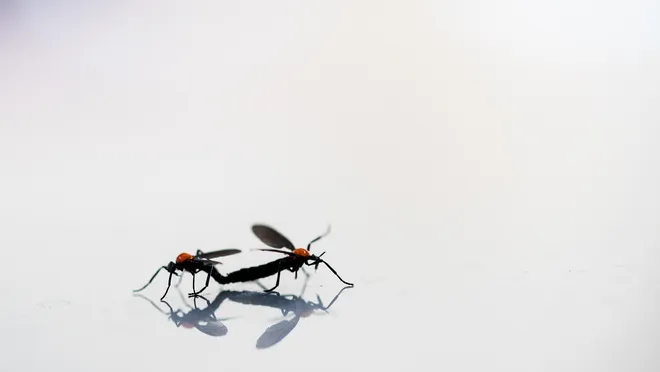
When Valentine’s Day rolls around, the presence of love is usually a good thing. But in Florida, there’s one kind of “love” you might wish to avoid—love bugs. These harmless but annoying pests thrive in Florida’s warm, humid weather, often causing widespread inconvenience for homeowners and drivers alike. If you’ve encountered love bugs and are searching for solutions without harming the environment, we’ve got you covered.
This blog will explore eco-friendly, non-toxic options to control love bugs while protecting your home—and the planet.
Before we jump into solutions, let’s quickly understand who we’re dealing with. Love bugs, scientifically known as Plecia nearctica, are small, black insects that are attracted to light and warmth. You’ll often find them in pairs (hence the name “love bugs”) during their mating season, which occurs twice a year—spring and late summer.
While they don’t sting or bite, these flying pests are notorious for swarming homes, getting stuck on vehicles, and even damaging car paint with their acidic secretions. Left unchecked, love bugs can turn into a nuisance that’s especially hard to ignore during their peak seasons in Florida.
Here’s how you can prevent and control love bugs without toxic chemicals, ensuring your Valentine’s Day—and every day after—is pest-free.
Prevention is the first step in green pest control. Love bugs are not strong fliers, which means they can easily enter your home through cracks, poorly sealed doors, and windows.
Love bugs are attracted to light—particularly white and yellow lights—making your porch or outdoor areas a prime target.
Say goodbye to harmful sprays, and hello to healthier alternatives.
Love bugs may be fond of light and heat, but they have plants they dislike too! Incorporating natural deterrents into your landscaping is an excellent way to prevent infestations while beautifying your garden.
If swarms have already invaded your outdoor space, you can use homemade traps to catch them effectively without resorting to toxic pesticides.
Fill a shallow dish with water and add a few drops of dish soap. Place it near a light source outdoors. Love bugs will flock to the light and become trapped in the soapy water.
For larger areas, consider hanging a sticky card or non-toxic adhesive trap.
Using eco-conscious pest control methods is more than just a practical choice—it reflects a commitment to sustainability, protecting the environment for future generations. Florida’s unique ecosystem is home to a wealth of wildlife, pollinators, and beneficial species that chemical pesticides can harm. Taking a green approach ensures that you’re targeting only the bugs you want to remove, leaving everything else undisturbed.
Sometimes, love bugs can be particularly persistent, especially during their mating season. If your DIY efforts aren’t enough, consider working with professional pest control companies that specialize in environmentally friendly solutions. Green pest control experts can assess your space, offer targeted interventions, and help maintain long-term pest-free environments—all while keeping harmful chemicals far away from your home.
It’s time to stop letting love bugs wreak havoc on your Florida home. With the green pest control strategies shared above and a local pest control expert near you, you can tackle these harmless but pesky invaders while keeping your commitment to environmental conservation intact. Whether you’re creating a citrus spray, rethinking your outdoor lighting, or sealing up your windows, every small step makes a big difference in keeping pests out and your home healthy.
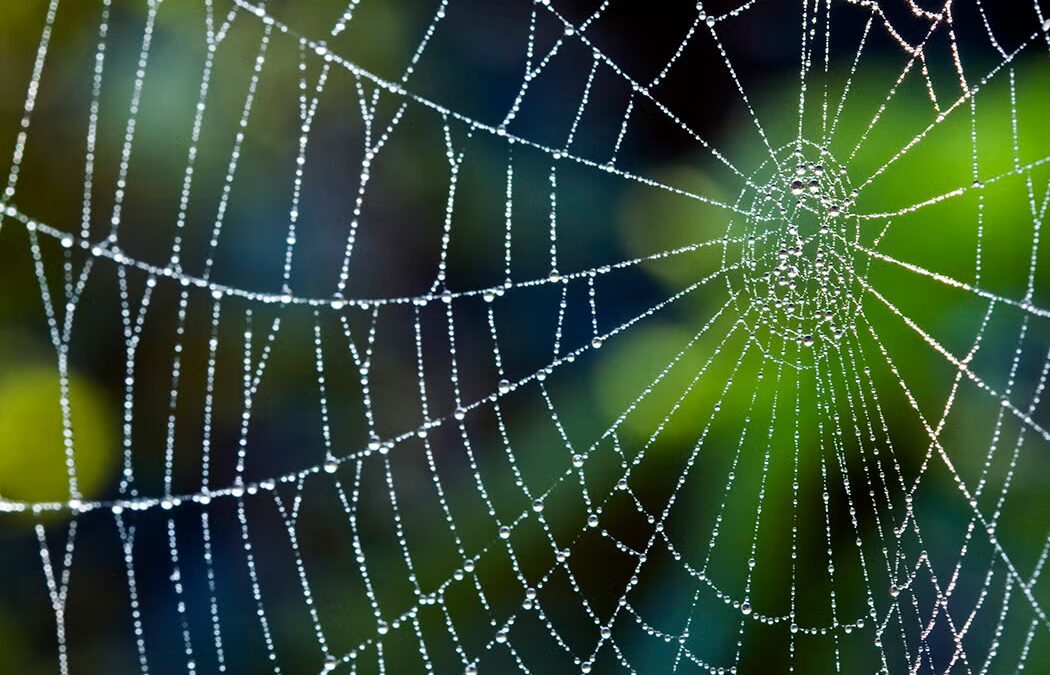
Living in Florida means enjoying the state’s lush ecosystems and warm climate—but it also means sharing your space with some unwelcome eight-legged visitors. While most spiders are harmless and even beneficial by controlling insect populations, others can pose serious risks if not properly identified and managed. If you’ve discovered a spider in your home or garden, this guide will help you recognize some of the most common spiders in Florida and give you the tools to handle them without causing any harm to you or them.
Spiders are nature’s pest controllers, reducing the need for chemical pesticides by preying on insects like flies and mosquitoes. However, not all spiders are friendly neighbors. Venomous species like the Brown Recluse and Black Widow can pose health risks to humans, which is why proper identification is essential. Knowing whether you can coexist or need professional help ensures that you take the right action.
For those focused on eco-friendly practices, understanding which spiders are harmless can allow you to protect beneficial species while maintaining a healthy environment around your home.
If you’re an environmentally conscious homeowner, there are several ways to manage spider populations while keeping your space pest free and sustainable:
Before rushing to remove every spider, remember their ecological benefits:
By allowing harmless species to thrive in and around your home, you’re supporting a balanced ecosystem that benefits both your environment and your family.
Living in Florida means sharing your space with spiders, but understanding which common spiders in Florida are beneficial and which are harmful will help you manage them responsibly. If you find yourself dealing with venomous spiders, don’t hesitate to contact a professional pest control service. Always prioritize eco-friendly methods for a pest-free home and a healthier local environment.
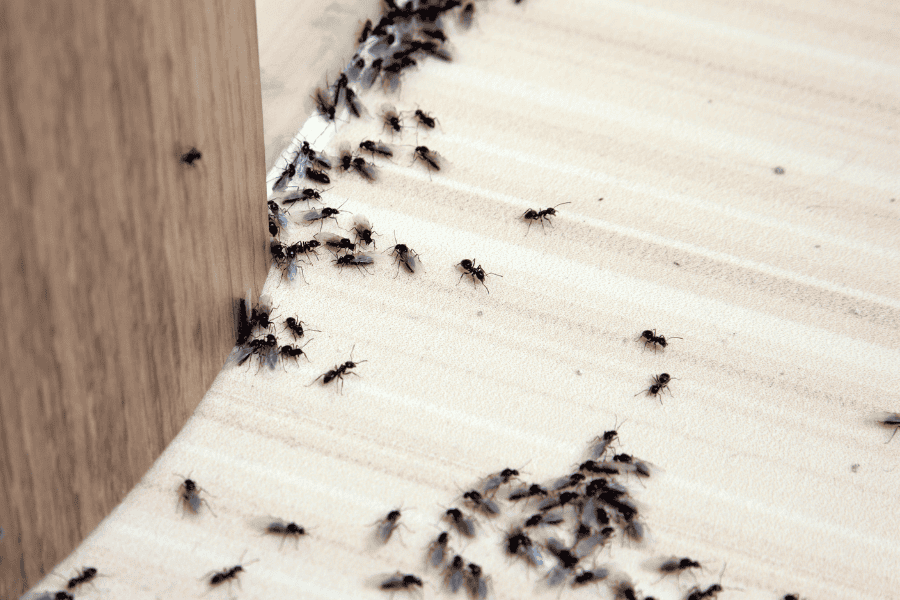
Ants are small, but they can cause big frustrations in your Miami home. Whether it’s Argentine ants marching through your kitchen or fire ants invading your yard, Miami’s warm, humid climate makes the city a prime destination for these pests. Traditional pest control methods often involve harmful chemicals, but eco-friendly ant control alternatives provide effective solutions that are not harmful for your home, health, and the environment.
Here’s how Miami residents can keep ants at bay with natural, green pest control methods that work.
Ants are always on the lookout for food, water, and shelter. Miami’s year-round warm weather, combined with the rainy season, creates the perfect environment for ants to thrive. They’re often attracted to crumbs, leaks, or even the smallest cracks in your home’s exterior.
Understanding which ant species you’re dealing with is key to effective pest control. Here are some common ants in Miami:
Using natural substances to repel ants is a great first step to keeping them out of your home:
Eco-friendly baits are a great way to target the colony itself. Mix sugar and boric acid into a paste and place it near ant trails. Worker ants will carry it back to the colony, slowly eradicating the infestation.
Diatomaceous earth is a natural powder that can be sprinkled around your Miami home. It dehydrates ants and works effectively in places like baseboards and entryways.
Ants are attracted to crumbs and food residue. Ensure your Miami home is spotless by:
Fix leaking pipes and faucets in your Miami home and dry up moisture in kitchens and bathrooms. Ants are always on the lookout for water sources and removing them will discourage them from entering.
Ants can sneak into your home through the smallest gaps. Be sure to:
Miami’s tropical environment provides a perfect place for ants to thrive. Here’s how to keep them out:
Certain plants can naturally repel ants while adding beauty to your home. Consider growing:
Miami’s warm climate makes ant infestations a common issue, but eco-friendly pest control solutions provide a greener way to protect your home. By using natural deterrents, sealing entry points, and focusing on prevention, you can keep your Miami home ant-free without relying on harmful chemicals. If you’re ready for a green pest control plan, contact a local pest control company for a free estimate.
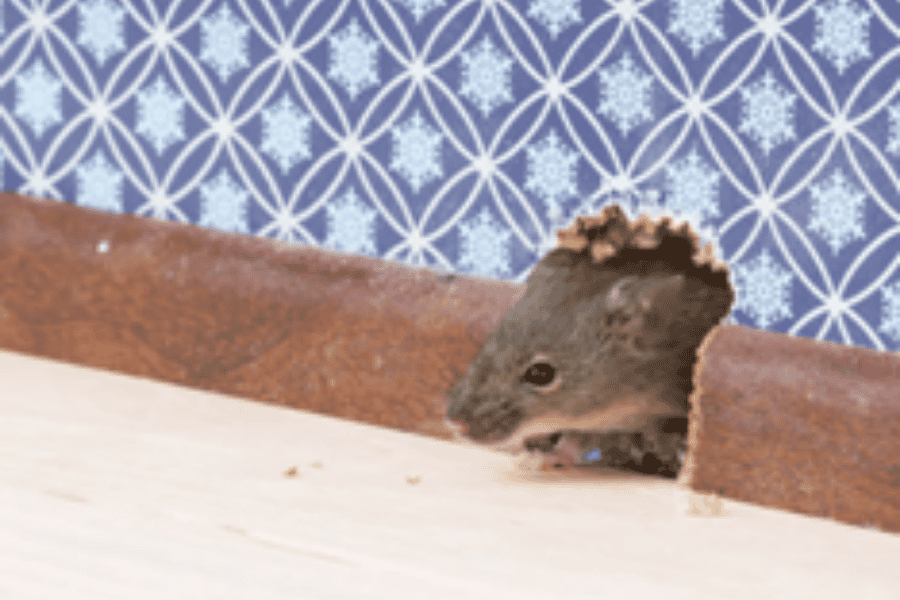
Rodents can cause serious damage to both your home and your health. If you live in Broward County, Florida, and want to protect your home from these pests, this guide will help you understand how to deal with rodent infestations effectively while keeping your living space safe.
This post will cover the types of rodents common in the area, why they’re such a problem, and the most effective ways to handle infestations. By the end, you’ll be equipped with practical solutions for dealing with rodents in your home.
Florida’s warm, year-round climate is an ideal environment for rodents like rats and mice, which thrive in urban areas and can cause significant structural damage. Common rodents in Broward include Norway and roof rats, both of which are known to spread diseases and damage insulation, wiring, and wood.
While managing a rodent infestation can be challenging, there are a number of effective ways to deal with it, from preventive measures to active control strategies.
The first step in controlling rodents is preventing them from entering your home in the first place. Inspect your home for gaps around doors, windows, and utility lines. Use durable materials like steel wool, copper mesh, or caulking to seal off potential entry points. Regularly check attics and crawl spaces for signs of rodent activity.
Traps and bait are some of the most common methods for controlling rodent populations. While traditional snap traps are effective, there are also more humane options available. Live traps, for instance, allow you to capture and release rodents away from your property. For bait, consider using alternatives to toxic chemicals, such as non-poisonous bait stations that are safe for pets and children.
Certain smells are known to deter rodents. Some natural repellents, like peppermint oil, can be used to create a barrier around entry points or areas where you’ve spotted rodent activity. Other deterrents include cayenne pepper and vinegar-water sprays.
Prevention is always better than dealing with an infestation. Here’s how you can minimize the risk of rodents in Broward County:
Dealing with rodent infestations quickly is essential to prevent long-term damage to your home and health. Rodents are not only a nuisance, but they can also spread diseases like leptospirosis, hantavirus, and salmonella. Taking steps to secure your home and eliminate food sources for rodents will make your living environment safer for you and your family.
By implementing these practical rodent control strategies, you can maintain a pest-free home and avoid the structural damage and health risks associated with rodent infestations in Broward County. Contact a pest control company near you today to get started.
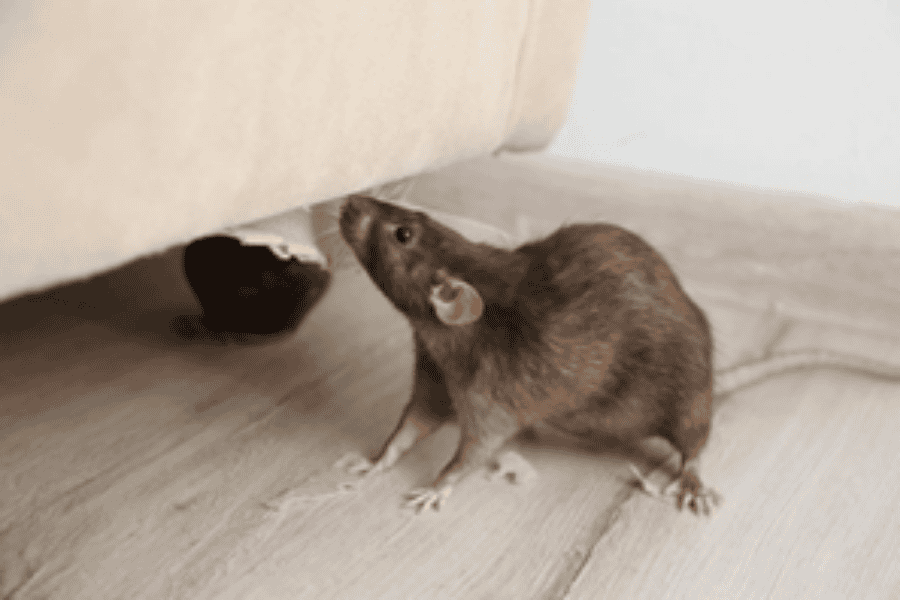
Winter brings cozy nights and festive moments, but for Pompano homeowners, it also signals the season when rodents like rats and mice seek shelter indoors. These uninvited guests can cause damage and spread health risks, but with the right measures, you can keep them out of your home. Here’s a guide to preventing rodent infestations this winter.
As temperatures drop, rodents look for warm spaces to nest. Here’s why they invade homes in winter:
Taking proactive measures can help protect your home from these winter invaders.
Keep an eye out for these common signs of a rodent invasion:
If you spot these signs, take action quickly to prevent further damage.
Rodents can fit through tiny gaps, so be diligent about sealing them:
Remove potential food and water sources:
A clean, well-organized environment makes your home less inviting to rodents.
There are a variety of traps to deal with rodent infestations:
If you’re uncomfortable setting traps, reach out to a pest control service for assistance.
A tidy yard reduces access points to your home:
A well-maintained yard makes it harder for rodents to gain entry.
If DIY solutions aren’t enough, consider professional rodent control services. Experts can provide:
Rodent-proofing your home doesn’t have to be difficult. By sealing entry points, setting traps, and maintaining your yard, you can ensure your home stays rodent-free this winter. For those seeking professional help, there are trusted pest control services ready to assist with comprehensive inspections and lasting solutions.

As Florida heads into 2025, homeowners will face an evolving pest landscape due to rising temperatures and increased rainfall. These changes are creating new challenges, but with the right information and green pest control solutions, you can protect your property from unwanted invaders while keeping your environmental impact low.
Warmer temperatures are accelerating pest breeding cycles, leading to larger populations of mosquitoes, cockroaches, and other pests. Milder winters also mean pests can survive year-round, requiring more frequent eco-friendly pest control efforts. To stay ahead, keep your home free of standing water and maintain clean, dry spaces, reducing the need for chemical treatments.
More rain creates ideal conditions for pests like termites, mosquitoes, and moisture-loving ants. Ensure gutters are clean, water collection areas are drained, and use dehumidifiers to keep humidity-loving pests at bay. Green pest control methods, like natural dehumidifiers and drainage solutions, help prevent pest problems while being gentle on the environment.
New invaders are making their way into Florida, including the Brown Marmorated Stink Bug, Tropical Bed Bug, and Cactus Moth . These pests pose unique challenges and require specialized control methods. By focusing on eco-friendly pest control, you can reduce reliance on harmful chemicals and take advantage of natural deterrents to keep these pests in check.
Familiar pests like cockroaches, ants, and rodents are adapting to the changing climate. Resistant cockroach strains, aggressive Argentine ants, and rodents seeking shelter indoors are just a few examples of how traditional pests continue to wreak havoc on our Florida homes! To handle these pest challenges, consider green pest control options like bait stations, traps, and natural repellents, which take the environment and your home into consideration.
Opt for natural repellents like essential oils, and preventive measures like sealing cracks and maintaining a clean home. These green pest control options effectively manage pests without harming your family or the environment. By adopting sustainable practices, you can keep pests at bay while reducing your ecological footprint.
As Florida’s climate changes, staying informed and proactive is key. Keep up with pest trends, partner with professional green pest control companies, and invest in regular home maintenance and prevention to protect your property in an eco-conscious way.
If you’ve noticed an influx of pests around your property this New Year, consider reaching out to a local pest control company near you. These professionals will provide you with an inspection and their treatment recommendations based on your pest situation.

As temperatures drop in Florida during December, homeowners often find themselves facing an increase in rodent activity. While Florida’s warm climate means pests like rats and mice are a year-round concern, winter months bring a few specific challenges that make Florida rodents more of a problem. Here’s why December is a particularly tricky time for rodent control in the Sunshine State.
Even though Florida doesn’t experience extreme winter weather, the cooler temperatures of December still drive rodents indoors. Rats, mice, and squirrels are all looking for warmth, food, and shelter as their natural outdoor food sources become scarcer and the air chills. Your home, with its heat and accessible food, becomes an attractive target.
A small rodent infestation in December can rapidly turn into a big problem. Mice and rats breed quickly—mice can reproduce as often as every 3 weeks! If you don’t address the issue right away, a handful of rodents can turn into dozens, causing more damage and creating more health risks as the season goes on.
Rodents are notorious for chewing on electrical wires, insulation, and even structural elements of your home. This can result in costly repairs and pose fire hazards. In addition to physical damage, rodents are carriers of diseases like salmonella, leptospirosis, and hantavirus. When they enter your home, they bring these health risks along with them.
As the days get shorter and the nights get longer in December, rodents become more active after dark. They often search for food during nighttime hours when there’s less human activity. If you’ve noticed strange noises or signs of gnawing at night, it could be a sign of an infestation.
The best time to deal with a potential rodent problem is before it gets out of hand. In December, rodent-proofing your home is crucial. Sealing entry points, setting traps, and eliminating food sources are all effective measures to keep rodents out. The earlier you address the problem, the easier and more cost-effective it will be to eliminate.
December presents unique challenges for Florida homeowners when it comes to rodent control. As Florida rodents seek shelter from the cooler weather, they can cause damage, spread diseases, and multiply quickly. By being proactive in rodent prevention, you can ensure your home stays clean and rodent-free throughout the winter months. If you encounter persistent rodent issues, consider contacting a local pest control company for expert assistance and tailored solutions to protect your home.

As the cooler weather settles in here in Pompano, homeowners may notice an increase in spider activity around their homes. While these eight-legged creatures can be unsettling, understanding their behavior and how to manage them can help keep your home comfortable and pest-free.
As temperatures drop, many insects become less active, which can lead spiders to seek shelter indoors where it’s warmer and food is more readily available. Spiders are natural predators, and they often move inside to find their next meal, which may include other pests hiding in your home.
Spiders are excellent at finding cozy spots to spin their webs. Here are some common areas you should check around your home:
While spiders play a beneficial role in controlling insect populations, their presence in your home may not always be welcome. By staying proactive and keeping an eye out for spider activity, you can maintain a comfortable living space in Pompano. Embrace the cooler weather and take these steps to ensure your home remains a cozy refuge—without any unexpected visitors!